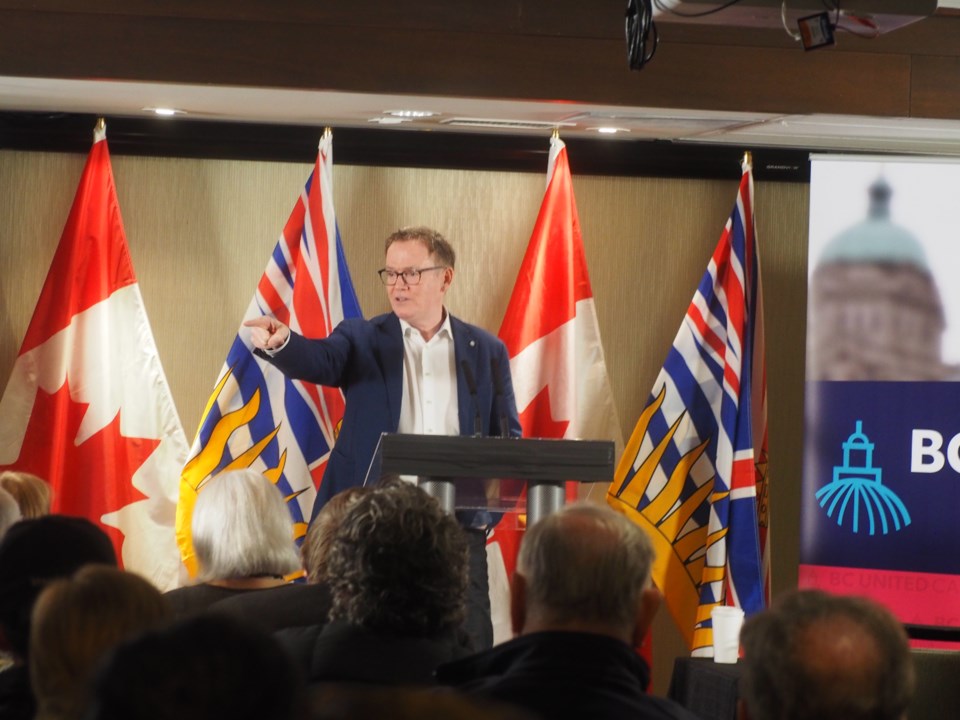B.C. opposition leader Kevin Falcon faced a (mostly) receptive audience at a town hall event at Executive Suites Hotel in Squamish this week, touching on a wide array of BC United talking points and fielding questions from the floor.
About 50 Squamishers turned out for the town hall on Mar. 7, where Falcon tested their history knowledge and spoke at length about the BC United (formerly BC Liberal) record and what he described as a lack of results from the NDP government, hitting the tips of all the waves on transportation, infrastructure, investment, the budget, healthcare, drugs and mental health, education, housing and childcare to intermittent applause.
Bureaucratic mire was a theme of attack that wound its way through the length of his talk, with Falcon saying the NDP was slow to make decisions, quick to increase administrative costs and eager to double down on bad policy.
“If we’re spending all that money and piling on that debt, surely we can point to some really great outcomes, right? That would be a natural inclination, but I’m sorry to say that we’re not seeing that.”
The number of vice presidents in the B.C. healthcare system (71) was listed as an indicator of bureaucratic bloat, with outcomes in healthcare used as proof that the system was not working.
“Why is it that with all those vice presidents we have some of the worst results in the country? ... We have too many people in administration and we’re not focusing on the frontline, the nurses, the doctors, the care aides, the allied healthcare workers—that’s a big part of the problem.”
To that, he said, if he were premier, those 71 administrators “better start getting their offices cleaned up,” and that he’d focus on cutting red tape to allow more internationally-trained Canadian doctors to enter the B.C. sector.
Pivoting to mental health, Falcon said that B.C. was doing “absolutely everything wrong, and we’re getting the worst results,” admitting that the previous BC Liberal government made mistakes in the sector, and that a government led by him would invest heavily so that those in need could get off the street and into 24-7 care.
To that, he moved on to drugs, saying the NDP were doubling down on policy that was making the situation worse.
“Instead of free drugs, I want to provide free treatment. I want to make sure those struggling with addiction have the best opportunity to get off of their addiction, and get better and become contributing members of society again.”
He reiterated plans to re-introduce letter grades in education and ban cellphones, and talked up his experience in the private sector in relation to housing before listing off four policy changes to come on that file: Removing PST for new homes; introducing 99-year leases for below-market rental housing; removing the transfer tax for first-time home buyers on purchases less than $1 million and the recently-announced ‘rent-to-own’ policy.
Questions from the audience
Questions from the audience ran a similar gamut, with only one tough question on his record as health minister, to which he scoffed at numbers being cited from a CBC report in 2009 about funding cuts and challenged the premise.
In a sign the audience was mostly friendly to Falcon, they did not respond well to the challenge.
COVID-19 came up once, with Falcon responding to a question about the NDP stepping in to remove healthcare professionals from the sector due to their vaccination status.
We are the only jurisdiction in North America that has still got fired doctors and nurses not allowed to come back into our health system because they were unvaccinated back in the day. And they were unvaccinated, many for very good health reasons," he said.
“Either we know something the rest of North America doesn’t know, or we’re wrong and we’ve got some ideologues that are keeping these folks we desperately need in our system right now helping us out in the midst of a healthcare crisis out of the system. They’re coming back under Kevin Falcon within minutes.”
On drug policy, one audience member asked what guardrails he would put in place to ensure that cancelling decriminalization of drugs didn’t create a pipeline to the criminal justice system for people in need of treatment, to which Falcon said he believed free treatment rather than free drugs was the best guardrail.
A regular issue locally is regional transit—a question from the floor was what a government led by him would do, to which he returned to the theme that the NDP was paralyzed by process.
“It’s all process [right now], they love meetings and emails and sending things back and forth and doing studies and all the rest—but you have to get beyond that, somebody has to make a bloody decision and say ‘we’re going to get regional transportation on the Sea to Sky Corridor, and I want it done, I want to see a plan on my desk in the next 60 days and I want to get going so we can execute it and make it happen in our lifetime… that’s how I found things have to get done.”
Asked about support for small businesses, Falcon touched on the budget, and shared anecdotes about a “sense of impunity” among criminals due to a lack of consequences.
Overall, besides the one question of funding cuts 15 years ago, the audience was receptive of Falcon’s message.
The party he leads, BC United, is yet to announce a new candidate for the local riding, with current MLA Jordan Sturdy having announced he would not be running earlier in 2024.
Falcon said that the party would announce a West Vancouver-Sea to Sky candidate within the next 45 days.
The next provincial election will take place on or before October 19 of this year.




